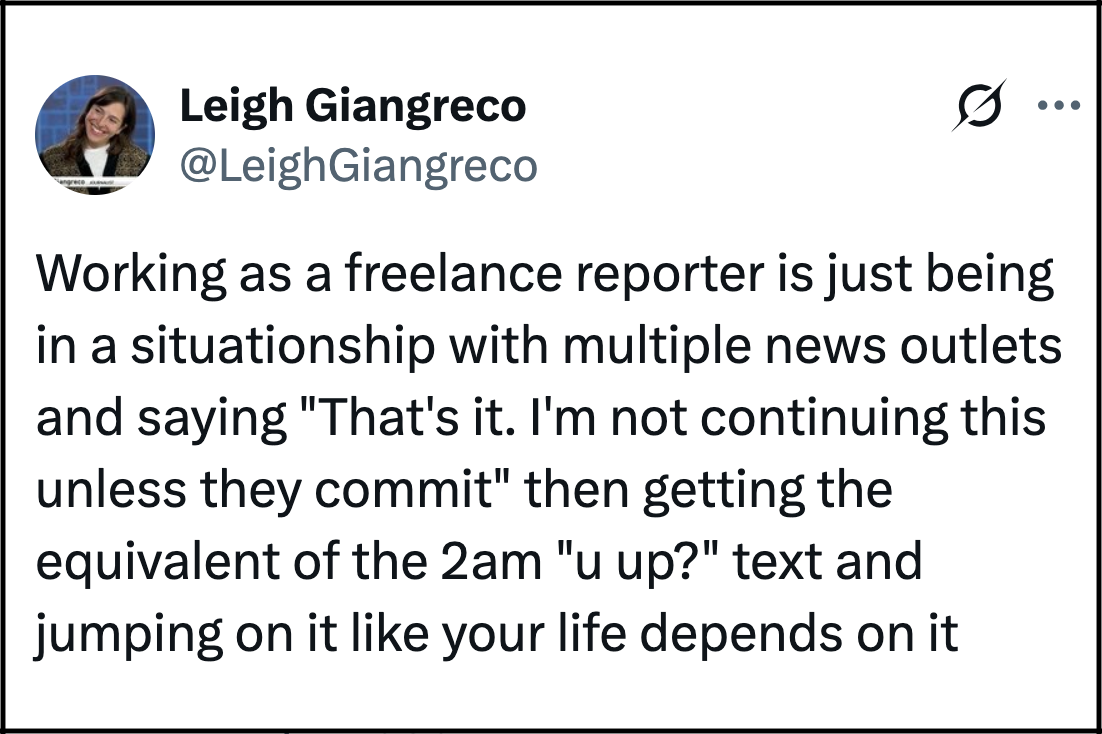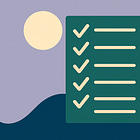A guide to the essentials of freelance journalism
New to the game? Here's a great place to start. Been in it a while? Time to brush up on your fundamentals.

Hello friends, and welcome to FWT’s Intro to Freelancing Month!
All month we’re getting back to basics. Each newsletter in August will focus on a different aspect of getting into and thriving in the freelance life, generally focused on newer freelancers (or just anyone who wants to up their game). We’ll cover smarter ways to use social media in your work, avoiding common mistakes that can sink you, dealing with finances, setting up productive workflows, and much, much more.
With that out of the way, today we’re covering some of the fundamental tools and strategies we all need to know and use.
First things first: Build your foundation
Get in contact with editors
Start, or keep, contacting editors at publications you want to write for and introduce yourself. That’s it! Don’t overthink it, and definitely don’t send a pitch. This is just to say hi and let them know you exist and are open to work. I recommend Twitter or LinkedIn DMs, cuz no one likes email. Some things you might want to ask about in your initial conversations:
Are they taking pitches at the moment?
Do they have pitching guidelines?
What are they looking for in a freelancer?
What is the best way to pitch them?
What stories are they not looking for?
Is there something they’re missing in their newsroom a freelancer could help with?
Create a plan to get those clips
This is an exercise I often do when I work with new freelancers in my one-on-one sessions, because it can be a clear and specific path to building up your portfolio. But it really can work for everyone.
Start by drawing up a list of 10 to 15 publications you would love to write for in the next, say, 12 to 18 months. Start reading them religiously to get familiar with their coverage, stuff they’ve done in the last few months, the tone and style of their stories, and just a sense of who they are. Next, try to identify gaps in their coverage you could potentially fill. (Even better, if you know the specific section within that publication you want to write for, do all of the above for that section.)
Really drill down and read the archives. Find where their news gaps are, and start generating story ideas you can pitch to plug those gaps. This can be a super efficient way to start building up your portfolio (and yes, you need one; more detail on this in the pitching section).
Network like craaaaazy
Your best resource as a freelancer is your network, so start building it ASAP. Like, seriously, these are your co-workers. As independents we don’t have the infrastructure or institutional support of a newsroom, so your support system is your freelance network.
Network horizontally, not vertically: Find peers who are generally in the same career stage as you. Those people will be your foundation, and finding people going through the same things you are at the same time will provide a much stronger and more supportive network, as opposed to finding the most famous journalist you can and seeing if they’ll respond to your DMs.
Freelancers are very open and willing to share, so don’t be shy. Some starter questions:
How did you get started in freelancing?
Which publications do you write for?
How do you write your pitches?
Can you show me a successful pitch of yours?
Do you mind sharing your rates?
Who are you reading lately?
Who else should I speak with?
Are there editors you’ve loved working with I should reach out to?
See if you can really connect with one or two freelancers you really admire and try to cultivate a mentor/mentee relationship. (Here’s where those famous journalists can come in!)
Pitching and working with editors
Get good at pitching
This is the most important thing you can do for your freelance career. In a nutshell: Be concise, get to the point, and give away the goods right off the bat. A pitch has one job, and that’s to get your story sold.
Editors are people, too
We’re just doing our jobs out here, and we definitely don’t have all the answers. (Or sometimes, any of them.) One thing to remember: just ask. No matter the topic — edits, money, contracts, story development, workflow, general advice — your editor is there to help you shine, and they want you to be happy. So just ask!
If finding an editor to pitch is difficult, figuring out what they really want is nearly impossible. Here are some guidelines to help you meet them in the middle: What editors are *really* looking for
Follow up! Here is when — and how — to do it
Don’t intimidate yourself out of pitching a major publication. If you have a great idea, swing for the fences. Your background/history/clips/portfolio/education/etc. matters a lot less than you probably think it does. Editors want great stories, no matter where they come from. If it’s not in the cards, let them reject you; don’t reject yourself before you even give yourself a chance.
How to get on an editor’s “regulars” roster: Consistency, reliability, and delivering what was agreed upon. And communication is key: Any “problem” isn’t really a problem so long as you talk about it; then it’s a conversation. It only becomes a problem when you don’t mention it.
Leveling up: money and workflows
Track your work
Don’t overthink it, just keep track of everything you’re pitching and what’s been commissioned, along with your money! Here’s a great system from a former writer of mine.
Speaking of money …
This is a tricky one. Rates vary by publication, story, editor, timing, scope, and most important, budget. A lot of the time it’s out of your editor’s hands and has nothing to do with you or your story. But you should still ask!
How to ask for more money — and actually get it. A few things to remember:
It’s not weird, unprofessional, or rude to ask for more money. Editors expect it and good editors want to pay you more. Sometimes the only way to get it is to ask.
Keep it simple and casual, but firm. You’re not doing this for fun, even if it is fun; you’re doing this to pay for rent and groceries. It’s okay to want more.
Keep asking if you don’t get it. They may not be able to give it to you for this assignment, but maybe the next one or the one after that the budget will be there.
Talk to your network and ask what they’re making. Rates are notoriously hard to figure out, so your best bet is to just ask other freelancers what they’re making. (Freelancers love to talk about this, so they’ll be glad to open up.)
Good luck out there!
-Tim
Oh, a few other things …
• I offer one-on-one coaching! Need help developing an idea or sharpening one you already have? Want a seasoned eye on a pitch you’re kicking around? Interested in talking about careers and building your freelance business? Maybe just want an edit on a story draft? I’ve got you covered! Click here to book a one-on-one coaching session to talk about pitch reviews, story development, editing, careers, and anything else you might need help with.
• Got a question about freelancing or the wider world of journalism? Let’s hear it, and I may feature it in a future Q&A post! Drop your questions, comments, and thoughts about freelancing and journalism in general in a comment below, or email me at tim@freelancingwithtim.com.
• More from Intro to Freelance month:









Greetings:
S Subscribed.
(Free for the moment.)
Would appreciate same.
Value your work.
Thank you.